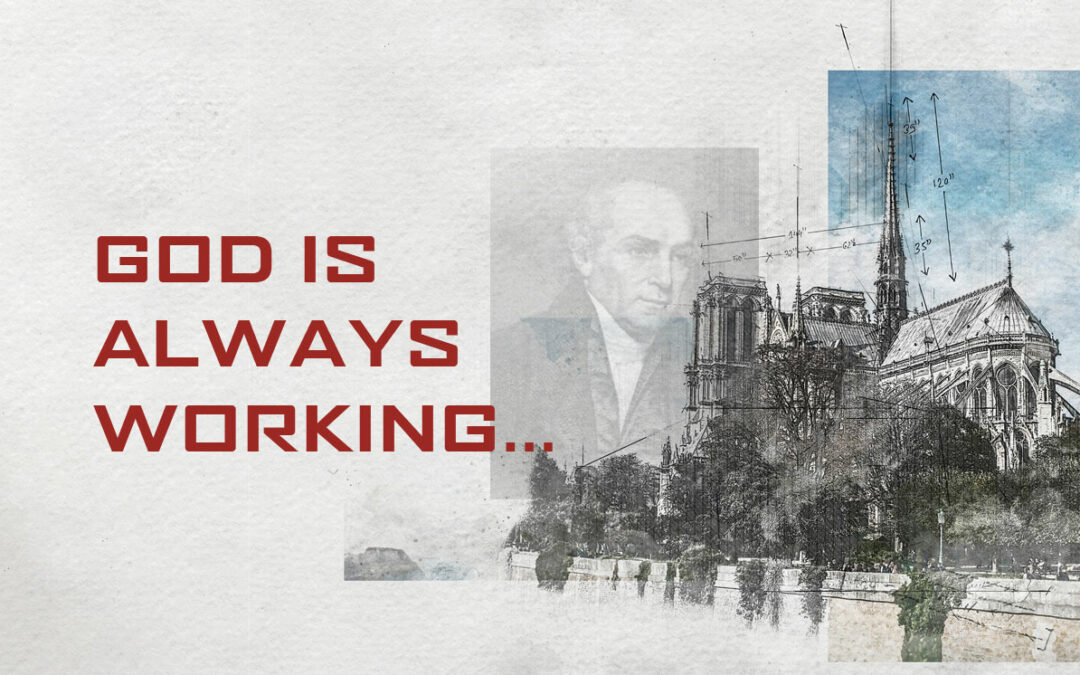God Is Always Working
Randall McElwain
It is the height of the French Revolution. During the Reign of Terror, 300,000 people will be arrested; 17,000 will be sent to the guillotine; another 10,000 will die in prison without trial.
Christianity is seen as a tool of the monarchy and the Revolutionary government determines to stamp out this outdated “superstition.” Man’s reason replaces God’s Word as the supreme authority for life. Priests are massacred and the government declares public worship illegal in France.
At Notre Dame Cathedral, France’s most famous symbol of religion, Maximilien Robespierre has 500-year-old statues removed and publicly decapitated. Then, on Nov 11, 1793, a “Festival of Reason” (a holiday dedicated to mocking religion) is held in the nave of the cathedral. A seductively dressed actress portraying the “Goddess of Reason” is paraded to the front and “worshiped” by thousands before the rest of the Cathedral is looted by the rioters. Enlightenment scholars pronounce Christianity to be dead in France and dying throughout the rest of the world.
But on this same day, thousands of miles away, God was at work. While secularists are celebrating the “defeat of God” in France, an unknown cobbler named William Carey lands in India. In the next forty-one years he will revolutionize that nation and spread the gospel to a land that had been captive to the false gods of Hinduism.
He will translate portions of the Bible into forty-three Indian languages. Then, he will apply the teachings of the Bible to Indian life. He will have such an impact that Vishal Mangalwadi, a 21st century Indian politician and scholar, calls William Carey “the Father of Modern India.” Imagine…a foreigner being called “the Father of Modern India”…by a native Indian! Such was his influence in that country.
When William Carey arrives in India, the Hindu religion controls all areas of life.
Lepers are burned alive to “purify them” for their next reincarnation.
Females are not allowed to attend school.
Widows are often burned on the funeral pyre of their husband.
Members of the Untouchable caste face nothing but a lifetime of pain. They are banned from schools and from all but the most menial jobs. They can never escape their caste.
William Carey begins to apply the teachings of Christianity to Indian society. Because Carey believed that nature reveals a loving God, he published the first science textbooks in India. To help feed the poor, he organized agricultural reforms to improve farm productivity. To fight the practice of astrology, he introduced the study of astronomy to India so people could see that the stars do not control our destiny.
Because he believed that God loves the leper, Carey campaigned for humane treatment of victims of leprosy. He destroyed the practice of child sacrifice. Because he believed that all people are equal in God’s eyes, he fought the oppression of the “Untouchables,” the lowest caste in Indian society.
Because he believed that true knowledge will point people to God, Carey started dozens of schools, established the first college in Asia, produced the first Sanskrit dictionary, and published the first newspaper in any Oriental language.
In order to publish his newspaper, Carey brought the first printing press to India and started a factory to manufacture the paper used on the press. To run the presses, he installed the first steam engine in India. Even India’s modern industries trace back to William Carey.
Because he believed that all people are created in the image of God, Carey fought the oppression of women. He started schools for girls, who rarely received any education in eighteenth century India. He battled polygamy, female infanticide, and widow burning. He worked for twenty-five years to achieve a legal ban on the burning of widows (sati). When a woman was elected governor of an Indian state in the 20th century, her political enemies said, “This is the fault of William Carey.”
While a European nation was “outlawing God,” large segments of an Asian nation were transformed by the power of God. Psalm 2 asks,
“Why do the heathen rage, And the people imagine a vain thing? The kings of the earth set themselves, And the rulers take counsel together, Against the Lord, and against his Anointed…”
The kings of the earth try to fight against a sovereign God, but their efforts are fruitless. David continues,
“He that sitteth in the heavens shall laugh: The Lord shall have them in derision. Then shall he speak unto them in his wrath, And vex them in his sore displeasure. Yet have I set my king Upon my holy hill of Zion.”
If you look around and feel that the enemies of God are winning, realize that while all eyes were on the public desecration of Notre Dame, God was quietly working His will through an unknown cobbler named William Carey. He is in control and He will accomplish His purposes in
our world.
“This is my Father’s world:
Oh, let me ne’er forget
That though the wrong seems oft so strong,
God is the ruler yet.”


